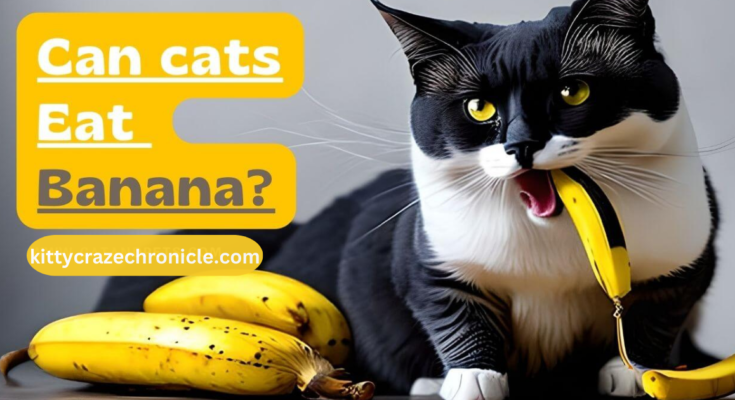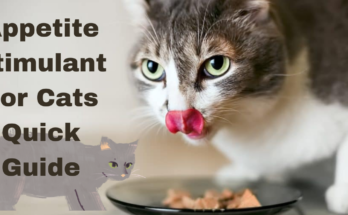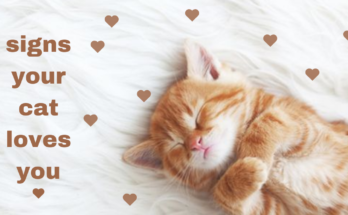Bananas are undoubtedly a tasty and healthful snack for humans, but what about our feline companions? Can cats also consume bananas? In brief, the consensus is that cats may safely consume bananas. But it’s vital to weigh the benefits and drawbacks before you let your cat go bananas on a banana. Put another way, your cat may not want to eat a banana simply because he can. Can Cats Eat Bananas? As discussed below
Are there Nutritional Benefits to Feeding Cats Bananas?
Cats have unique nutritional needs that have to be satisfied by their food, and these needs aren’t the same as those of people or even dogs. Being obligated carnivores, cats must consume only animal items for nourishment, just as they would in the wild. However, this does not imply that you must go out and catch mice for your cat; however, allowing your cat to consume rodents may cause parasitic infections.
It implies that treats like bananas are unnecessary since your cat receives all the nutrition he needs from his regular cat diet. Furthermore, more isn’t always better when it comes to food. Giving a cat more nutrition than he needs may lead to issues. Regarding bananas, your cat receives no advantage from these high-carb fruits.
Downsides of Feeding Cats Bananas
That varies on the particular cat, but since cats are famously picky eaters, most of them are less interested in trying new meals than dogs are.
Furthermore, many cats even have a phobia of bananas
Experts say that this is because most cats loathe the ethyl acetate scent, and these fruits give up. Rubbing peels of bananas on items might be an excellent method to keep your pet from scratching them. There’s also the chance that the shape of the banana reminds him of a snake and alarms them.
How to feed bananas to your cat
Banana peels are “choking hazards and not digestible,” so if you decide to feed your cat bananas, remove the peel. This information is from Hill’s Pet Nutrition. Give your cat little meals of the banana.
Bananas may not be your cat’s thing. When talking about their sweet receptors, cats’ senses of taste are not as developed as those of humans. As a result, they do not share human interest in sweet foods like bananas. Avoid pressuring them to consume it if they respond negatively.
Benefits of Feeding Cats Bananas
Dr. Bayazit said, “A healthy cat can eat small quantities (about an inch) of bananas as an occasional treat.”Your cat’s daily calorie intake from treats shouldn’t exceed 10%.
Caloric intake. Consult your veterinarian about your cat’s daily energy requirements and use the Pet Nutrition Alliance’s convenient calorie calculator.
Benefits include being an excellent source of soluble fiber and having a high potassium content. Here is the complete list:
- – Bananas are abundant in potassium, which promotes renal and cardiac function.
- -They are a great source of soluble fiber and vitamins B6 and C.
- – Cats need glucose from bananas to function.
- – Bananas are a healthy, natural treat that is harmless.
- – They may be a novel treat and a relatively nutritious snack for cats without health problems if provided seldom.
- -Cats who get to consume something new from their typical diet may adore the taste and be enthusiastic about the chance.
- – Therefore, bananas are not only healthy for cats to eat, but they also have specific health advantages
Downsides of Feeding Cats Bananas
Bananas are not poisonous, but there is a reason why you should only feed them in modest amounts.
Cats, in contrast to dogs, are obligated carnivores, meaning they have evolved exclusively to survive on meat.
Furthermore, they don’t need carbs in their diets since their digestive systems could be better at processing plant-based foods. However, giving your cat an excessive amount of sweet carbohydrates might cause difficulties if they have health conditions (diabetes, for example).
The following are some drawbacks of cats and bananas:
Unlike dogs, cats often dislike sugary treats and can be less accepting of unfamiliar foods in their meals, according to Dr. Bayazit.
For cats, bananas may result in digestive problems such as pancreas inflammation, constipation, loose stools, vomiting, and regurgitation.
Overindulging in bananas may have negative effects on a cat’s health due to high levels of sugar, particularly if the cat has a heart attack or stroke, issues with the liver, diabetes, or obesity.
Have More Questions?
Can Cats Eat Bananas?
When kittens are ready to eat, usually after eight weeks or so of weaning, they should only eat high-quality cat food rich in nutrients like calcium, magnesium, and protein. Once your cat becomes a year old, you may start giving them treats like bananas. Dr. Bayazit advises against allowing young cats to develop an unhealthy obsession with sweets.
Why is my cat such a banana fan?
Although every cat is unique, some may really take to human foods like bananas. A tiny slice every now and then is entirely appropriate if your little darling has a particular fondness for bananas (as well as since your kitty is in excellent form!).
How does eating a banana affect a cat?
After a few bites, a healthy cat ought to be perfectly fine. They could even return, begging for more. However, every cat is different and has a distinct tolerance for novel foods.
A sensitive cat or person with a health problem may experience nausea, vomiting, diarrhea, or regurgitation. Giving out sweets too often or giving out a lot of bananas may cause weight gain and high blood sugar, both of which can contribute to diabetes.
Dr. Bayazit advises stopping the treatment and calling your veterinarian “if you observe something like [an upset stomach].”
Can cats eat any other fruits? Is it possible for cats to consume watermelon?
Along with their cat food, cats can consume a broad range of fruits, such as:
Pears and apples (peeled and seedless)
Various berries, like – Watermelon without seeds
- – Mangos
- – pineapple
- – Apricots
- – Honeydew Strawberries
- – blackberries, cranberries, raspberries, and blueberries
- – berries
What fruits are dangerous or harmful to cats?
There are some fruits that you should never feed your cat because they are toxic to cats and may cause negative reactions.
These fruits include:
- – Fruits containing citrus include oranges, tangerines, lemons, grapefruit, and limes
- – Cherries
- – Unripe tomatoes
- – Grapes
- – Raisins
- – Avocados
I hope that helps!
If your pet consumes any of these dangerous human foods, call your doctor or an urgent care vet facility immediately to decide on treatment.
Key Points
- – Although they don’t poison cats, bananas are high in sugar, which is difficult for cats to digest.
- ‘While giving your pet the occasional bit of banana as a treat won’t likely hurt them, frequent banana consumption can raise blood sugar levels in pets and lead to diabetes and weight gain.
- – Vomiting, diarrhea, and upset stomachs can result from consuming too many bananas.
- – Eating bananas won’t help your cat. If you give them nutritious snacks that contain meat, they will fare better.
- – Your veterinarian is the best person to advise you on what to feed your feline friend. Eating bananas won’t help your cat. If you give them nutritious snacks that contain meat, they will fare better.
- Your veterinarian is the best person to advise you on what to feed your feline friend.
Summary
Cats may not be able to eat bananas despite their being a favorite and healthful snack for people. Unlike humans or dogs, cats have unique nutritional needs and must consume only animal items for nourishment. Treats like bananas are unnecessary as cats receive all their nutrition from their regular diet. Cats may not enjoy bananas due to their picky eating habits and phobia of the ethyl acetate scent. To feed bananas to your cat, remove the peel and give them small portions. Rich in potassium and soluble fiber, bananas support healthy kidney and heart function.
Bananas are a healthy, natural cat treat, providing vitamins B6 and C, soluble fiber, and glucose. However, overfeeding cats with excessively sweet carbohydrates may cause health issues like diabetes.
Cats often dislike sugary treats and may be less accepting of unfamiliar foods. Overindulging in bananas can lead to digestive problems, such as pancreas inflammation, constipation, loose stools, vomiting, and regurgitation. Overindulging in bananas can also have adverse effects on a cat’s health due to high levels of sugar, particularly if the cat has heart attacks, strokes, liver issues, diabetes, or obesity.
Kidneys should only eat high-quality cat food after eight weeks of weaning. Cats can consume various fruits, including pears, apples, and berries. However, certain fruits are toxic to cats and may cause adverse reactions.
To ensure your cat’s health, consult your veterinarian for advice on what to feed them. Bananas are high in sugar, which is difficult for cats to digest. Frequent banana consumption can raise blood sugar levels and lead to diabetes and weight gain. Providing nutritious snacks containing meat will help your cat fare better.




